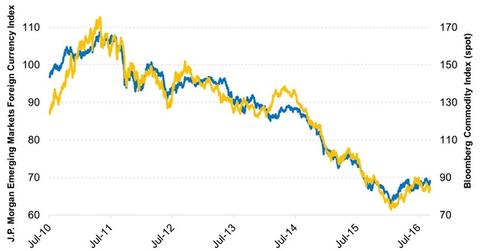Stable Commodity Prices Have Supported Emerging Market Bonds
Perhaps one of the biggest tailwinds recently, particularly for local currency strategies, has been the stabilization and rebound in commodity prices this year.
Sept. 13 2016, Updated 3:04 p.m. ET

Perhaps one of the biggest tailwinds recently, particularly for local currency strategies, has been the stabilization and rebound in commodity prices this year. We believe that commodity prices bottomed in the first quarter of 2016. Supportive monetary policies, continued demand, and the reduction of oversupply issues are expected to benefit commodity prices and the currencies of emerging markets with significant commodity exposure. Emerging markets currencies and commodity prices have historically exhibited fairly high correlation, and both are still far below their recent peaks in 2011.
We believe emerging markets debt will remain attractive for income seeking investors, who may benefit from the yields the asset class can potentially provide as well as supportive fundamentals and global monetary policies.
Investors can access bonds issued by emerging markets governments and denominated in local currencies with VanEck Vectors J.P. Morgan EM Local Currency Bond ETF (EMLC). In addition, VanEck Vectors EM Investment Grade + BB Rated USD Sovereign Bond ETF (IGEM) provides access to the higher rated subset of the broad U.S. dollar-denominated emerging markets sovereign bond universe.
Market Realist – Stable commodity prices have led to slightly stronger emerging market currencies
The graph above compares the JPMorgan Emerging Market Currency Index with the Bloomberg Commodity Index. As you can see, the two tend to move in tandem. This is because many emerging markets are reliant on commodity (OUNZ) exports for economic growth, and as commodity prices have fallen over the last few years, so have emerging market currencies.
However, over the last seven months, commodity prices have stabilized, reinstating investors’ faith in emerging market bonds. Currency plays a big part in the returns of those bonds denominated in local currency. A weaker local currency negatively affects the returns of the bond. Currencies tend to be very volatile, which is why currency stabilization has led to higher inflows into emerging market bonds.
Higher commodity prices reflect better fundamentals for many emerging markets. Also, the Chinese economy (PEK) hasn’t struggled as much as it was expected to, which has propped up commodities.
